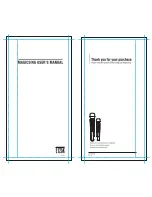
The ART200A is a full-range two-way
professional active speaker system that
combines high power and wide bandwidth in
a light-weight enclosure for fixed-installation
systems. The 12" low-frequency transducer, in
combination with a 1" compression driver
coupled to an integral 90˚ x 70˚ constant
directivity polynomial horn, form an extremely
powerful package for any small to medium-
sized sound reinforcement application.
It features a balanced XLR input with a
Mic/Line switch and a paralleled balanced
XLR output for cascading multiple speakers.
Rear panel controls also include Music and
Voice equalization switches, a rotary volume
control, and an input limiter.
The two built-in power amplifiers provide
120W for the LF driver and 40W for the HF
driver. The enclosure is constructed of high-
strength polypropylene, with M10 threaded
inserts on all four sides for rigging, and an
integral locking 1-3/8" socket in the bottom
for mounting on a standard speaker stand.
Safety First!
Before connecting and using the
equipment, please read this Quick-Start Guide
carefully and keep it for future reference.
WARNING!
This equipment has been
designed to be installed by qualified
professionals only! There are many factors to
be considered when installing professional
sound reinforcement systems, including
mechanical and electrical considerations, as
well as acoustic coverage and performance.
Mackie Industrial strongly recommends that
this equipment be installed only by a
professional sound installer or contractor.
1. Never install, connect, or disconnect
the unit with the power supply on.
2. Before powering up the speaker,
make sure the voltage select switch
corresponds to the AC Voltage supply.
3. Make sure the safety ground on the
power cord is properly grounded.
4. To prevent the risk of electric shock,
never open the unit. There are no
user serviceable parts inside.
5. To ensure normal cooling of the
amplifier, make sure the unit is well-
ventilated. Avoid exposure to direct
sunlight or proximity to any heat
source, dust, or dampness.
Voice Equalization:
+4.0 dB @ 3kHz
+4.0 dB @ 6kHz
Indicators:
Power ON, Limiter
Amplifiers:
LF Amplifier Power:
120 watts RMS
HF Amplifier Power:
40 watts RMS
Distortion:
< 0.1% THD at rated power
Amp Protection:
Thermal, limiter, short circuit
Power Supply:
115/230 VAC, 2A, 50/60 Hz
Physical:
Enclosure:
Asymmetrical trapezoidal,
reinforced polypropylene
Mounting:
Lockable 1-3/8" (35mm) stand
mount
Rigging Inserts:
4 points, accepts M10 threaded
hardware
Input/Output Connectors:
2 XLR balanced
Dimensions HxWxD:
24.4" x 15.4" x 12.3"
(620 mm x 390 mm x 312 mm)
Net Weight:
39.7 lb (18.0 kg)
Specifications
System:
Freq. Range (–10 dB):
50Hz-19kHz
Freq. Response (
±
3 dB):
70Hz-17kHz
Horz. Coverage Angle (–6 dB):
90
°
, averaged 1kHz-10kHz
Vert. Coverage Angle (–6 dB):
70
°
, averaged 1kHz-10kHz
Directivity Factor Q (DI):
9.5 (9.8), averaged 1kHz-10kHz
System Sensitivity:
101 dB, 1W@1m
Rated Maximum SPL:
122 dB @ 1 m (3.3 ft) peak
HF Protection:
Dynamic
Transducers:
Low Frequency:
12" (300 mm) diameter woofer
High Frequency:
1" (25 mm) compression driver,
horn loaded
Preamp and Processor:
Input Sensitivity:
Mic In:
8mV
Line In:
125mV
Input Impedance:
Mic In:
650
Ω
unbalanced
1.3k
Ω
balanced
Line In:
10k
Ω
unbalanced
19k
Ω
balanced
Crossover Frequency and Slope:
1.8kHz; 24 dB/octave
Time Alignment:
Analog, 0.3 ms HF delay
Speaker Protection:
Thermal, over-excursion
Music Equalization:
+4.3 dB @ 65Hz
+4.0 dB @ 12kHz
Part No. 910-161-20 Rev. A 2/00
© 2000 Mackie Industrial. All Rights Reserved. Printed in the USA.
CAUTION:
To avoid the risk of electric
shock, never allow this equipment to
be exposed to rain or dampness.
industrial@mackie.com
16220 Wood-Red Road NE Woodinville, WA 98072
TEL
+888.337.7404,
FAX
+425.487.4337
UK
+44.1268.570.808,
FAX
+44.1268.570.809 +industrial@rcf-uk.com
ITALY
+39.0522.354.111,
FAX
+39.0522.332.294 +industrial@rcf.it
FRANCE
+33.3.8546.9160,
FAX
+33.3.8546.9161 +industrial@rcf.fr
GERMANY
+49.2572.96042.0,
FAX
+49.2572.96042.10 +industrial@mackie.de
ART200A
Active Speaker System
Quick-Start Guide




















